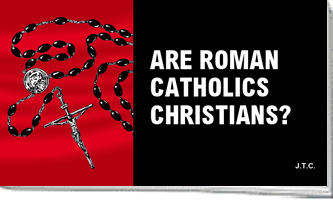Chocolate Skulls, Anyone?
- Issue Date: January/February 2021
Another evidence of the pope’s failure to follow the scriptures occurs in the Latin American Catholic community. It is called the Day of the Dead when the spirits of deceased relatives supposedly make a return visit to their families. It is a takeoff on the traditional All Souls day with a mixture of Aztec.
Various communities see the erection of an altar of sorts that includes pictures of departed relatives and offerings of drink, food, or incense. Focus this year was on the family members who had died of the coronavirus. Some altars even featured chocolate skulls.
How the festival plays out in daily life is illustrated by comments recorded in a recent christiannews.net article.
One lady in the San Diego, California, area commented on the construction of her altar that, because of the restrictions on visitors to hospitals, people die alone, but the altar “…makes it even more important that we welcome them [their spirits] back." Another, explaining the significance of the incense said that it clears the space of any negative energy or bad spirits and helps the dead find their way.
The celebration has a very complex root system in the history of Catholicism. Ultimately it taps into the teaching of purgatory where departed Roman Catholics spend an unknown amount of time in torment paying for light-duty (venial) sins that were not absolved prior to death.
Heavy-duty (mortal) sins are a different matter.
Unless they are fully “absolved” before death, chances of heaven are limited. Purgatory is not considered adequate for mortal sins. However, the pope has a fix for that, providing that a priest is handy before death.
The pre-death ceremony of Last Rites can smooth the pathway into eternity. But pinning down this process is difficult due to the convoluted nature of Catholic teachings. It basically involves confessing to the priest who has the power to forgive (absolve) it.
In the book we've recently made available again in print, "Night Journey from Rome", ex-priest Clark Butterfield describes a continuous and pervasive sense of guilt that he experienced as a Roman Catholic:
“It is the syndrome of constant, oppressive, unshakeable awareness of guilt, and it is simply and accurately labeled, ‘Catholic guilt.’ It is unique and peculiar to that system.”
Describing his decision to become a priest, he said:
“I simply reinserted myself into the intricate web of guilt, punishments, penances, ritualism, and on-again off-again salvation, a ready victim for the powerful assaults of the devil…”
"My guilt feelings began in those early grade-school years. I began to question the integrity of my Confessions —did I confess everything I had to? and the correct number of times? Was I truly sorry? Did I receive Communion in the state of grace, or was I condemning myself to hell by unworthy Communions? Did I pay proper attention at Mass? Did I consent to ‘impure thoughts’? The list is endless. And the guilt accumulated and extended its venom to all my waking hours…"
“Rightly did Martin Luther call the Catholic practice of obligatory confession to a priest ‘a butchery of consciences,’” says Butterfield.
The re-release of "Night Journey from Rome" provides another valuable tool for soul winners who have relatives or friends who need to “come out” of this unscriptural bondage.
• • • • •
• • • • •
Chick Publications has many other resources to help convince people that they are in danger of losing their eternity with Jesus and their loved ones, if they continue with this false “church”.
Please visit our information center on Catholicism to see all resources on this subject. You may also see our free catalog for more information.
- See more articles on related topics:
- Catholicism
- Catholic Doctrine vs Scripture
Other Articles from January/February 2021:
- Suicide —Looking for Help in All the Wrong Places
- Vatican Power Politics More Important Than Truth
- Blind Soul Winner Rescued by the Constitution
- Ancient Fortress More Evidence of Bible History
- A Message from David Daniels
- Jehovah's Witnesses New Tactics
- Sermon Gets Air Force Chaplain Discharged
- Missions Fund Report: January 2021
More on Catholicism:
Products of Interest:
-

Night Journey From Rome
208 Pages
Former Catholic priest, Clark Butterfield, describes how he placed his faith in Christ alone, and left the Catholic church. A talented writer, he goes on to explain how the Scriptures disagreed with his church, and why he had to leave the priesthood. 
Are Roman Catholics Christians?
Show Catholics that neither their good works nor their religion can save them.-

Understanding Roman Catholicism
224 pages
37 Catholic doctrines from the current Catechism are compared with the Scriptures. They're not Christian!



